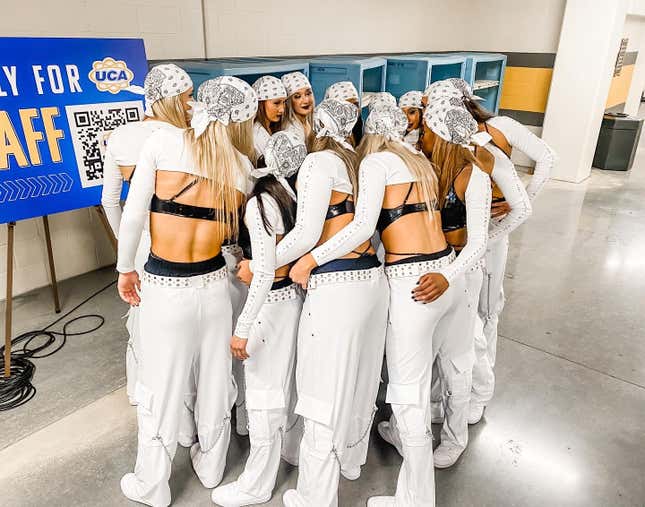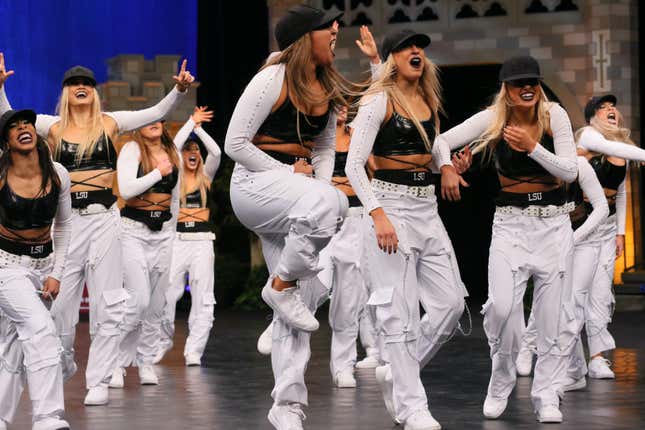What the LSU Tiger Girls Won When They Danced to ‘Like a Boy’
LSU barred its dance team from competing at nationals, putting the needs of "revenue sports" first. So the Tiger Girls fought back.
In Depth
Image: Varsity / Courtesy of LSU, Kandace Hale
Caliea Koehler could feel the heat of their eyes upon her.
As the 20-year-old co-captain of the LSU Tiger Girls got off the bus after a 12-hour drive to Orlando, she noticed young athletes from all around the country buzzing with nervous energy and suited up in bedazzled warm-ups boasting their school letters. It’s easy to get bogged down by the pressure of these high-stakes showdowns, but Koehler was grateful she had the chance to step off that bus at all. Against their will, the Tiger Girls, one of the most prestigious dance teams in the country, had been notably absent from the UCA and UDA College National Championship—the Super Bowl of collegiate dance and cheer—the year prior. In 2021, Louisiana State University had barred the team from competing in-person at nationals due to the “many constraints of COVID-19,” as an official had told local news station WAFB. Koehler told Jezebel, however, that LSU had allowed the Tiger Girls to perform in-person and masked at university sporting events, including football and basketball games and gymnastics meets, waving their pom-poms in support of other competitive athletes during one of the dreariest seasons of the pandemic.
Across the nation, dance teams found themselves trapped in similar battles for resources and budget, stuck somewhere between a poorly funded competitive sports team and an amateur student club. Long considered secondary to men’s and women’s “revenue sports,” dance still struggles to establish itself as a “serious” sport in the eyes of the NCAA—as well as naysayers, misogynists, and swaths of the general public. The Tiger Girls even have a term for it: They call themselves “half-letes.”
Now, the entire collegiate landscape had turned its gaze upon LSU’s dancers, waiting to see if their return would be triumphant, marked by anger, or perhaps unremarkable. Headphones in, Koehler and her teammates marched forward. They had a job to do.
A blur of rehearsals, mark-throughs, sit-ups, and face gems later, the LSU Tiger Girls took the mat for the Division IA Hip Hop finals. Koehler’s adrenaline was pumping. She felt her tunnel vision kick in, as the sound of the crowd chanting, “LSU, LSU!” faded to a muted rumble. They had trained their entires lives for this moment: here, with their best friends on the mat. “We’d been through so much,” teammate and junior Sanai Frierson said. “I remember thinking, we’re here, we’re finally here.” Then the speakers erupted, filling the room with the first few orchestral notes of Ciara’s “Like a Boy.” The dancers’ heads snapped up and the crowd roared, the gravity of the team’s message tugging the entire room into their orbit. Ladies, I think it’s time to switch roles.
That night, the LSU Tiger Girls danced for the right to be seen as equals to their male counterparts. With every wide-legged stance, every step that dripped with masculine swagger, every pelvic thrust, and every crotch grab, they demanded attention and respect, as is customarily given to cisgender male athletes simply existing in the world. They fought back… and won. Within one minute and fifty-three seconds, dancing to a women’s empowerment pop anthem written over a decade earlier, the LSU Tiger Girls architected their own revolutionary sports comeback story.
“All our Spirit Squads represented LSU proudly at nationals, and we are very happy their hard work led to deserved success. The talent, passion, and energy they bring to every performance are unrivaled, and we will continue to work to ensure their efforts are fully supported,” Cody Worsham, LSU’s director of strategic communications, told Jezebel in an email comment.
As Koehler put it, “They definitely know who we are now.”
-

-

-

-

-

-

-

-

-

-

-

-

-

-

-

-

-

-

-

-

-

-

-

-

-

-

-

-

-

-

-

-

-

-

-

-

-

-

-

-










































